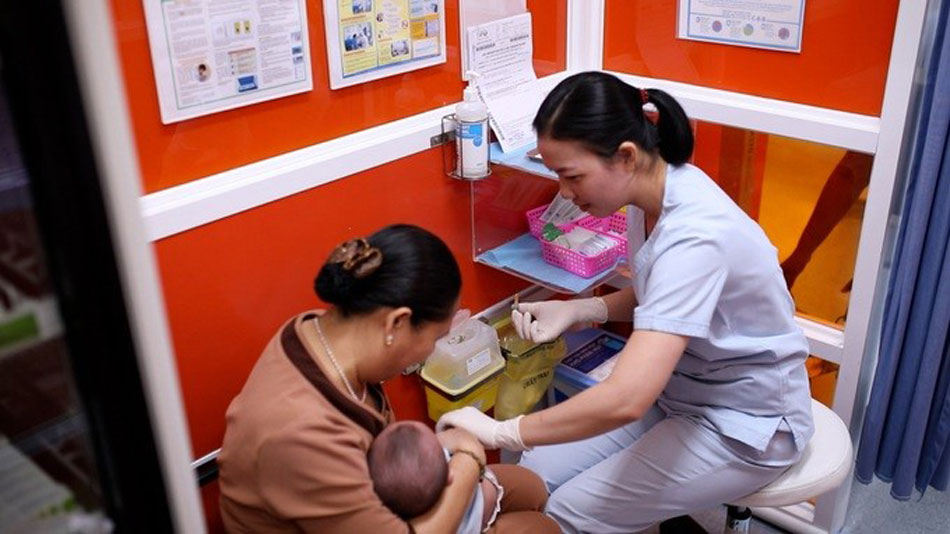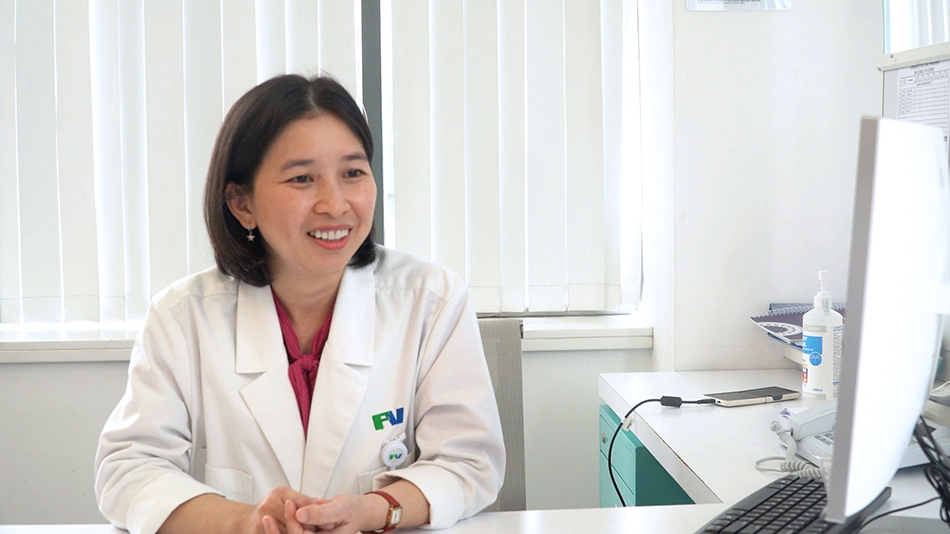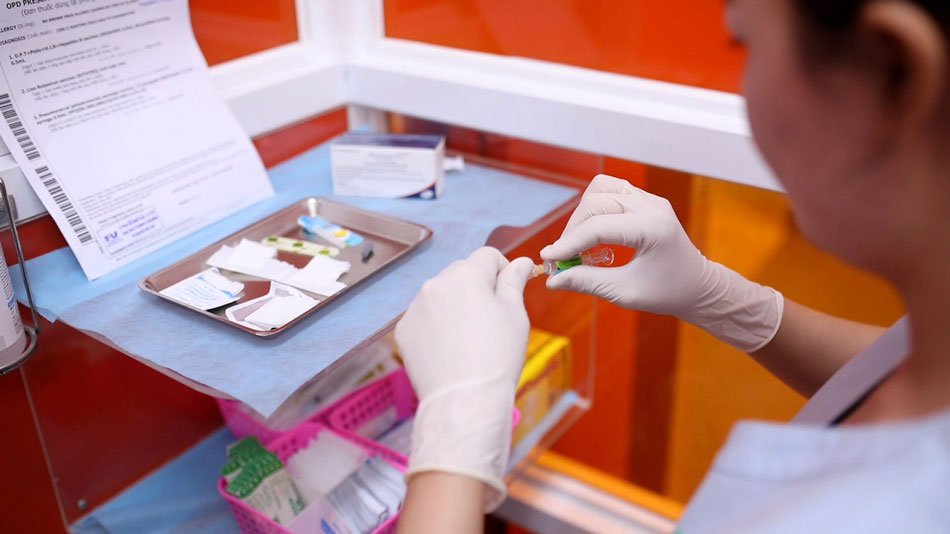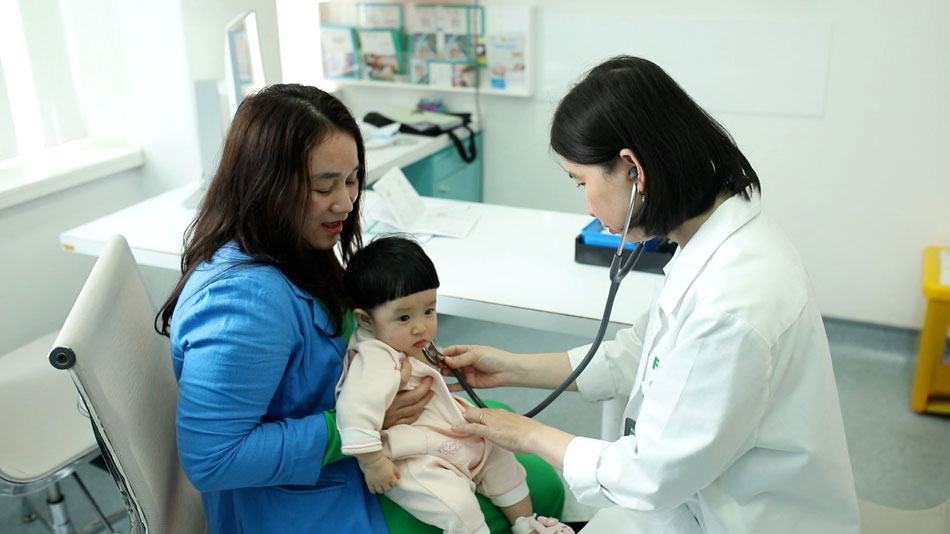Adequately vaccinating children before the age of two is very important to ensure they benefit from maximum protection against various dangerous diseases, and to build a solid foundation for children’s physical and mental development.
Many parents have already signed up for FV Hospital’s vaccination programme for children aged under 24 months. This programme reserves vaccines for each child enrolled, and staff will notify parents when it’s time to visit the hospital for vaccination – parents no longer need to worry about forgetting their children’s vaccination schedule, or their child missing out on timely care due to a temporary shortage of some vaccines.
No need to worry about a lack of vaccines when you sign up for FV’s vaccination programme
Vaccination: build active immunity for your children from birth
“Vaccines play an extremely important role for children, especially in their first two years of life,” says Dr Truong My Hanh Tram, Senior Consultant, Paediatrics & Neonatology Department, FV Hospital.
From birth, children are exposed to pathogens, such as viruses and bacteria that are always present in the environment. Although the body is armed with natural defences, including the skin barrier, the structure of the pharyngeal tonsil, and cells with immune functions, these structures are not always effective at preventing infection by particular pathogens.
The immune systems of children who have pre-existing conditions or diseases work less efficiently and are less able to protect the body. Additionally, the process of actively protecting the body against viruses or bacteria can further weaken the child’s system, making them more vulnerable and potentially leading to complications that may cause lifelong sequelae or even death.

Children under 24 months need to be vaccinated with all recommended vaccines
Dr Hanh Tram explains that vaccination helps to create active immunity because every vaccine is specific to the pathogen in the vaccine’s composition and helps to supplement and optimise the body’s protection defences. As a result, children will typically not become seriously ill when exposed to these pathogens. If a child does contract a disease, symptoms will be milder and the duration of the illness will be shorter, avoiding complications sequelae, and the need for intensive treatment.
Comprehensive community vaccination is also important in creating herd immunity, providing indirect protection for children who are too young to be immunised, or who cannot be immunised for medical reasons, Dr Hanh Tram adds.
Which vaccines should children receive in the first two years of life?
According to Dr Hanh Tram, new-born babies need to receive the first dose of hepatitis B vaccine and TB vaccine within two to three days of delivery. At two months, three months and four months, babies need to be vaccinated against diphtheria, pertussis, tetanus, polio, Hemophilus influenza B and hepatitis B. Babies also need to be vaccinated to prevent pneumococcal disease during this period.
At six months and seven months, babies need two flu shots. From the age of nine months onwards, children need to be vaccinated with three more vaccines to protect against measles, Japanese encephalitis and meningococcal disease.
At one year, children should be vaccinated against measles, mumps, chickenpox, rubella, hepatitis A, receive booster pneumococcal and combination vaccines.

Dr Truong My Hanh Tram provides advice on immunisation programmes for children in the first two years of life
“It is important that children receive the correct vaccines at the right time and at the optimal dosage. As soon as the child is at the age to be vaccinated, parents should bring them to the clinic: children need to receive regular vaccines from two months of age onwards. Some types of vaccines may have higher rate of complications and side effects if a child receives the first dose later than recommended—the diphtheria-pertussis-tetanus vaccine is one that should not be delayed,” explains Dr Hanh Tram.
Parents also need to understand that the frequency of injections depends on the vaccine. Each type will have its own schedule: the total number of doses needed and the interval time between doses varies, and parents will be consulted by their child’s doctor before vaccination.
Following the recommended number of doses and ensuring the optimal interval between doses will help young children to establish strong immunity against many dangerous diseases. Children with underlying medical conditions, including cardiovascular, lung and neurological conditions, asthma, and epilepsy, are more at risk of serious illness, complications and death than other children should they become infected. Therefore, parents should prioritise the vaccination of the right type and dose for their children.
What is the optimal vaccination schedule for children?
Some vaccines are scheduled to be given simultaneously. For example, a 5- or 6-in-1 vaccine (diphtheria, pertussis, tetanus, polio, haemophilia, hepatitis B) is indicated for children from two months of age, with a one- to two-month interval between doses.
A synthetic pneumococcal vaccine with rotavirus diarrhoea prevention is also indicated for babies from two months of age, with the same interval between doses. At two months, three months and four months of age, children should receive these three vaccines.
Many parents wonder if receiving multiple vaccines at the same time will affect their baby’s health. Dr Hanh Tram says that, in principle, a schedule of vaccination can include more than one injection at once as injecting multiple vaccines at the same time does not cause more side effects than a single shot. Combining vaccines reduces the number of times a child needs to visit their doctor, helping to increase schedule compliance so that children receive vaccines at the earliest opportunity.
Recently, some localities in Vietnam experienced a temporary shortage of vaccines, causing concern in parents with children of vaccination age, with some even taking their children abroad for vaccination. Dr Hanh Tram says that the current domestic supply is adequate, especially for important vaccines for children in the first two years of life, so parents should not worry. In prestigious medical centres, the vaccine source is guaranteed to be of clear origin, well-preserved and of an international-standard.

FV Hospital uses high-quality vaccines to immunise children
To create favourable conditions for families to protect their children from birth, FV Hospital has implemented a vaccination programme for children aged from 0 to 24 months. When registering to buy a vaccination package, all vaccines in the package will be kept separately under the child’s name in cold storage, ensuring the stock of vaccine is maintained according to the vaccination schedule for each individual, without running the risk of vaccines being out of stock when it’s time for a baby to be vaccinated, especially for harder-to-source shots such as the Infanrix Hexa (6:1) and pneumococcal.
Another benefit of this programme is that the prices of vaccines included remain static, so parents don’t need to worry if a vaccine suddenly becomes more expensive. They will also receive reminders from FV’s medical secretaries along with sufficient information about FV’s comprehensive vaccination programme for children and the vaccines included.
FV Hospital always uses a source of high-quality vaccines with clear origin and guarantee safety from check-in to storage so parents can enjoy peace of mind when registering their children for FV Hospital’s vaccination programme.

With the vaccine package programme at FV, parents can be assured that their children will receive all the necessary vaccines in the first two years of life
Vaccinated babies at FV Hospital will be carefully examined by a team of experienced doctors and nurses from the Paediatric Department before, during and after vaccination, ensuring the highest degree of safety, quality care and comfort for the babies. The examination area is beautifully decorated; vaccination rooms are private and well-ventilated, helping children to feel at ease.
For more information about FV’s vaccine programme, parents can contact the Department of Paediatrics & Neonatal Department via email: information@fvhospital.com or phone: (028) 54113333, extension: 1231.



